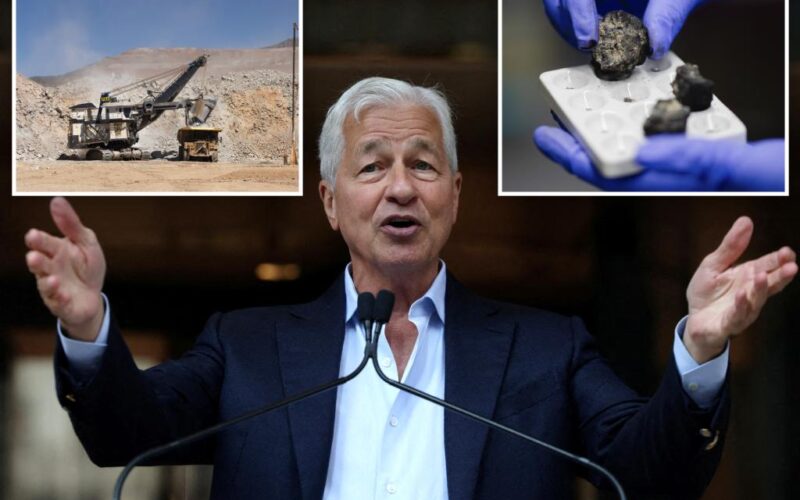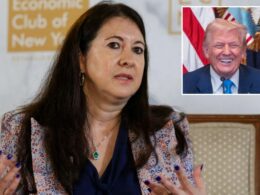JPMorgan Chase says it will invest up to $10 billion in companies considered critical to US national security — a sweeping effort by the country’s largest bank to shore up domestic supply chains and reduce dependence on China as trade tensions continue.
The initiative, announced Monday, is part of a massive 10-year plan to finance and facilitate $1.5 trillion in projects spanning defense, energy, and advanced manufacturing.
JPMorgan said the move reflects a “national security imperative” to rebuild US industrial capacity in sectors vital to the economy and military.
The announcement came after President Trump moved Sunday to ease tensions with China, writing on social media: “Don’t worry about China, it will all be fine!”
The online missive followed Trump’s Friday threat to impose 100% tariffs on Chinese products after Beijing on Thursday issued new export controls on rare earths and metals used in clean energy, chipmaking and defense systems.
“It has become painfully clear that the US has allowed itself to become too reliant on unreliable sources of critical minerals, products and manufacturing — all of which are essential for our national security,” JPMorgan CEO Jamie Dimon said in a statement.
The bank’s new investments will target four broad areas: supply chains and advanced manufacturing; defense and aerospace; energy independence and resilience; and frontier and strategic technologies.
“This new initiative includes efforts like ensuring reliable access to life-saving medicines and critical minerals, defending our nation, building energy systems to meet AI-driven demand and advancing technologies like semiconductors and data centers,” Dimon stated.
The program aligns with the Trump administration’s “America First” industrial strategy, which has sought to reclaim domestic control over critical minerals.
Since 2023, China has imposed sweeping export controls on at least 16 key minerals — including antimony, germanium and gallium — with shipments to the US effectively halted since late 2023.
Beijing’s restrictions have sent global prices soaring and left manufacturers scrambling for alternative sources, Reuters reported in April.
In recent months, Trump has blasted China’s “hostile” mineral policy, accusing Beijing of trying to “hold the world captive.”
Amid the back and forth, the Dow plunged nearly 900 points Friday after Trump warned of a “massive increase” in tariffs.
Following Trump’s Sunday post on Truth Social, Dow futures rose before the opening bell on Monday.
“Highly respected President Xi just had a bad moment,” wrote the US commander-in-chief. “He doesn’t want Depression for his country, and neither do I. The U.S.A. wants to help China, not hurt it!!!”
Washington has been racing to expand North American mining and processing capacity.
Earlier this month, the administration said the US would take a 10% stake in Canada’s Trilogy Metals, a small firm developing vast copper and cobalt deposits in Alaska’s Ambler region.
Shares in Trilogy soared more than 200% after the deal.
The White House said that investment reflected a “renewed federal commitment to responsible resource development” aimed at countering China’s near-total dominance — which extends to about 90% of global rare-earth processing.
China’s leverage over the mineral trade has emerged as a central obstacle in ongoing tariff negotiations.
Beijing controls as much as 99% of global processing for several heavy rare earths used in fighter jets, electric vehicles and smartphones.
Washington has accused China of “choking off” supplies to the US’ western allies in defiance of a 90-day trade truce agreed earlier this year.
“China is strategically choosing minerals for export restrictions that have a disproportionate impact on our military readiness and national defense,” said Mark A. Smith, CEO of US-based miner NioCorp.
“They hold virtually all of the cards.”
Lawmakers including Rep. Don Bacon (R-Neb.) have warned the US must “anticipate the worst” and find new sources to avoid a potential supply shock.
“If this is an option for China and we’re playing hardball, oh yeah, they can shut this stuff down if they wanted,” Bacon told The Post in June.
The renewed urgency around mineral security has drawn attention from Wall Street, as well.
Dimon, long one of the most influential voices in American finance, has increasingly framed JPMorgan’s mission in patriotic terms, urging business leaders to treat resource independence as both an economic and national security challenge.
The bank said it had already committed about $1 trillion toward critical industries over the next decade and now plans to increase that target by 50%.
While JPMorgan did not specify which companies it plans to back, the bank indicated the funds will go primarily to US-based ventures that strengthen domestic production of high-priority goods such as semiconductors, batteries and defense materials.
The initiative also builds on Trump’s Executive Order 14241, signed earlier this year, which fast-tracked mining permits, launched a National Critical Minerals Strategy and ordered an investigation into Chinese mineral imports.
The White House has also established a federal fund to accelerate domestic mineral recycling and processing capacity.
Dimon’s announcement follows a long line of JPMorgan financing goals aligned with public policy priorities — including the bank’s 2021 pledge to invest $2.5 trillion in climate and sustainability projects.








